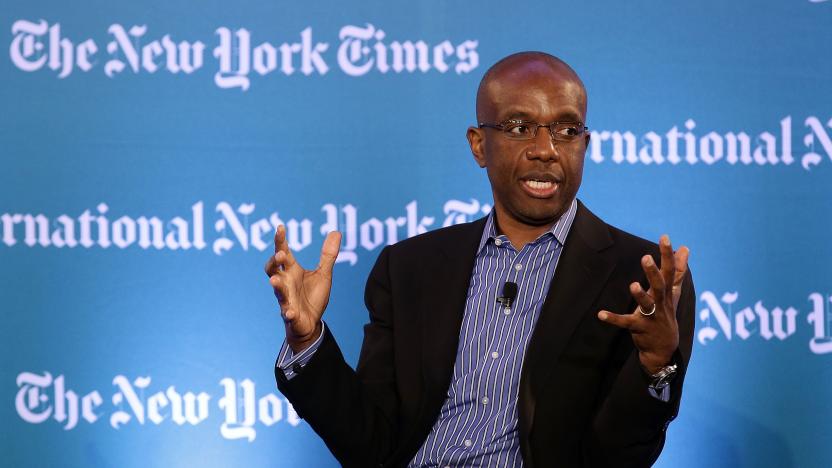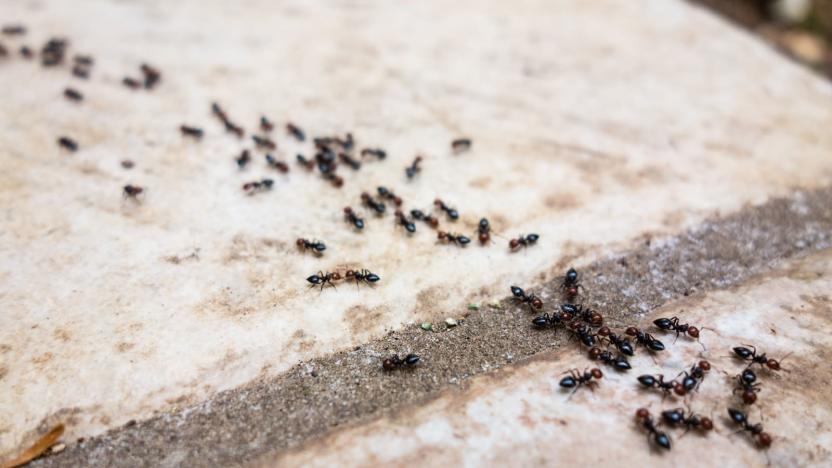Society
Latest

Hitting the Books: Why we like bigger things better
In "Size," Dr Vaclav Smil takes readers on a multidiscipline tour of the social quirks, economic intricacies, and biological peculiarities that result from our function following our form.

Google's new senior VP will explore technology's impact on society
Google has hired a new senior VP that will explore technology's impact on society — right as many are blaming the company for some of the world's ills.

Mark Zuckerberg's resolution is to talk about tech's place in society
Facebook CEO Mark Zuckerberg sets himself a challenge each year. In the past, he's created an AI assistant for his home and committed to learning Mandarin. This time around, after a torrid year where Facebook faced myriad privacy scandals, he's planning to hold a number of public discussions about how technology plays a role in the future of society.

‘Robotic Habitats’ imagines a self-sustaining AI ecosystem
As artificial intelligence advances at an unprecedented pace, we tend to see its arrival in emotional terms -- usually, either excitement or fear. But Noumena, a collective of designers, engineers and architects, is looking at AI and robots more practically. What form will they take, how will they survive and develop, and where will they live? It aims to explore those ideas with an exhibition entitled "Robotic Habitats."

How humans will learn to love the robots of tomorrow
For the Perfect Strangedroids discussion panel on Wednesday, Engadget hosted a trio of robotics experts. Sabri Sansoy, CEO and chief roboticist of Orchanic; Nader Hamda, founder and CEO of Ozobot; and Stu Lipoff, IEEE Life Fellow and president of IP Action Partners all took the Engadget stage at CES 2018, with senior editor Andrew Tarantola moderating. Click here to catch up on the latest news from CES 2018.

Gene-altered ants show how animal societies work
How much is societal behavior dictated by genetics? Scientists at Rockefeller University might just find out through ant colonies. They've modified the genes of clonal raider ants (not shown above) to see how the changes affect social behavior, both individually and on a grander scale. Knocking out genes for odorant receptors leads to "lone wolf" ants who wander by themselves for days, for example. The team keeps track of these exceptions by painting the ants in such a way that computers can track them all day, spotting even slight deviations from the norm.

CIA claims it can predict some social unrest up to 5 days ahead
Back in March 2015, the CIA chief began setting up a new office, the Directorate of Digital Innovation, to integrate the latest tech into the agency's data-gathering workflow along with boosting the country's cyber defense. According to its director, the department has helped the CIA as a whole improve its "anticipatory intelligence." Speaking at the Next Tech event yesterday, Deputy Director for Digital Innovation Andrew Hallman noted that, in some instances, they've been able to forecast social unrest and societal instability in other countries by as much as three to five days out.

Americans think it's rude to stay glued to your phone, do it anyway
You're no doubt astute enough to know that you should stop using your cellphone in some social situations, but how good are you at heeding your own advice? If Pew's latest study is any indication, the answer is "not very." The research center found that 82 percent of American survey respondents see cellphone use as a bane to social interaction, but that 89 percent of phone owners used their devices during their most recent gatherings. And they weren't just checking for notifications, either -- more than half of those surveyed were messaging, taking photos and answering calls.

Google teaches Glass owners how to mind their manners
Google wants society to welcome Glass with open arms, but that hasn't proven to be easy when some early owners have run into trouble -- there's a real chance that one bad user could ruin the eyewear's reputation. To get on the public's good side, the company has published an etiquette guide that teaches Glass wearers how to be on their best behavior. Many of the tips reflect common sense, but bear repeating: ask before you record anything, avoid wearing the device in risky situations and pay attention to the world around you. However, the guide is also a reminder that you're effectively Google's ambassador when you use Glass. The company wants you to politely answer questions from curious onlookers, and it prefers that you take off the eyepiece when asked instead of creating a fuss. The advice is strictly optional, but we'd suggest taking it seriously. It may be the key to social acceptance if Glass ever goes on sale to the general public.

Australia takes the hint, postpones plans for PRISM-style snooping
Here's some good news for anyone who considers Australia a haven from pernicious surveillance laws. The antipodean government has decided to postpone plans to force phone and internet companies to retain two years' worth of personal data after a scrutiny committee demanded changes. While it's not a total win for privacy fans, the legislation will now be re-examined after elections scheduled for September 14th -- with the Attorney-General Mark Dreyfus saying that the government will now "await further advice," before amending the prospective law.

The social aspect of WoW
I always remember sitting in Shattrath. Sometimes for hours, scrolling through trade, seeing the same messages over and over again. "LF1M Shadow Labyrinth, CC." Every so often, the discussion comes back to how grouping tools are ruining World of Warcraft's social aspects. The arguments are usually the same, talking about how before the Dungeon Finder people had to have active guilds or set up groups via trade, how the servers had a sense of community, how you have to get out there and put groups together and make friends in order to play WoW, and how that's lost now. And whenever I see this argument, I remember sitting in Shattath, sometimes for hours, trying to get a group for Shadow Labyrinth. People never really seem to remember those times when they're talking about this. Now, I've made a lot of friends in WoW over the years. Through server x-fers, through tiers of raiding, through old school days of dungeon running. I talk to a lot of these people to this day, and I've raided actively since the days of Molten Core. And yet, when people bemoan the tools that have been added to this game all I can remember is sitting in Shattrath, doing the "LFG Shadow Labyrinth" shuffle, looking at other people also looking for groups. Watching those groups demand that any new DPS have CC (warriors didn't) and that any new tank be an AoE god (warriors weren't) so they didn't have to use that CC they wanted you to have.

Theory of cliodynamics uses science to predict history, sees violence erupt in cycles
Ever get the feeling that you've seen it all before? University of Connecticut researcher Peter Turchin has, and he (along with Russian partners Sergey Nefedov and Andrey Korotayev) has even crafted an entire scientific theory around the idea. Cliodynamics, as it's called, works on the view that broad trends of history occur in predictable patterns based on common factors like government strength, population size and social inequality. The surprise to Turchin is that violence outside of wars, at least in the US, triggers roughly every 50 years like clockwork: people rebel against a social crisis, but their children stay out of the fray and lead to the conditions that ultimately trigger another outbreak, like the 1970s civil rights and peace movements. Don't set your watch to cliodynamics just yet. Many historians are still skeptical, and even supporters note that one-off events or major wars fall through the cracks. If the theory pans out, however, science could be used to help governments do the right thing before they're made to do it at gunpoint. [Image credit: Steve Wilson, Flickr]

Man acquitted as #TwitterJokeTrial appeal ends in victory
Paul Chambers, who was previously found guilty of sending a "menacing tweet," has been acquitted by the High Court after two-and-a-half years trapped in legal limbo. On hearing of the closure of his local airport, the 27-year-old had sent out a facetious tweet to his 600 followers that mentioned "blowing the airport sky high!" However, despite airport authorities realizing the message was a joke, the UK's Crown Prosecution Service took the man to court and won. The social network quickly rallied around, with many repeating the tweet with the hashtag #IAmSpartacus and involving celebrities such as Stephen Fry, who helped raise funds to launch an appeal. The court today found that its joking nature was "obvious" and that it was sent by someone who did not hide their identity -- clearing Mr. Chambers name once and for all. For the record, here was the original tweet with expletives removed: "C**p! Robin Hood Airport is closed. You've got a week and a bit to get your s**t together, otherwise I'm blowing the airport sky high!!"

Storyboard: The social contract
Have you ever thought about the fact that every single one of your characters is a murdering thief? Picture the scene for a moment: You have a group of people living in an isolated and rural community. Without warning, a man with heavy weaponry bursts in and starts hacking his way through every inhabitant of the community, smashing his way into locked houses. But he also stops at the body of each victim to gather any money or important belongings, slowly working his way through the community until there's nothing left but carrion and a few trinkets he didn't deem valuable enough to steal. On the news, this would be up there as a pretty shocking tragedy. In an MMO, this is a good chunk of the gameplay. And that brings to mind one of the major issues that faced by roleplayers hoping for verisimilitude: the horrible discrepancies between the social contract as we understand it and the one employed by the characters in the game. They're divergent sometimes, identical at other times, and universally ambiguous.

Chinese prisoners forced to produce virtual gold, real profits for their guards
The virtual goods economy of massively multiplayer online games may be thriving, but it's also stimulating an undesirable side-effect: exploitation. A former detainee at a prison in Heilongjiang province, China, has told the Guardian about how he was habitually forced into playing MMOs like World of Warcraft for the collection of loot, which the prison guards would then resell online for as much as ¥6,000 ($924) per day. Such totals would be the product of up to 300 inmates working 12-hour daily shifts, though predictably they saw none of the profits themselves. The unnamed source was at a "re-education through labor" camp where the usual toil would involve actual, rather than virtual, mining. The profitability of the online market has seemingly inspired prison bosses to move with the times, however, with business being so brisk that the computers "were never turned off." A Chinese government edict from 2009 is supposed to have introduced a requirement that online currencies only be traded by licensed entities, but it's believed that the practice of using prisoners in this fashion continues unabated.

Ethnologist researches the development of social skills in World of Warcraft
A lot of players probably think that World of Warcraft breeds social skills, to the extent that contempt for one's fellow human beings can be considered a social skill. But according to Peter Stenberg of Umea University in Sweden, there are some actual developments taking place when you play. Stenberg has just released a thesis detailing the social developments he observed during his 250-day stint in the game, discussing the ways in which the virtual environment begins to blend into the real world and develop complex social structures. As Stenberg puts it, the overall atmosphere of the game forms a collective and developed society apart from the real world, something he claims "challenges the rather persistent view of the computer game enthusiast as a lone figure with only a flickering screen for company." Of course, veteran players of MMOs have no doubt noticed a wide variety of social structures that develop within a game, but Stenberg's work is interesting if for no other reason than it's meant as a serious examination of the phenomenon.

National Day of Unplugging 2011 starts now, but only after you tweet about it
Darren Murph was scheduled to write about the National Day of Unplugging 2011, which spans from sundown on March 4th to sundown on March 5th. Unfortunately, this post was delegated to him too late in the evening. He had already "unplugged." You could bother to search Facebook and Twitter to see his last snippet of digital communication for the day, but then you'd be laughing in the face of this marvelous idea. Your call. You know who you have to answer to in the end.

15 Minutes of Fame: Jane McGonigal on why gamers will change the world
From Hollywood celebrities to the guy next door, millions of people have made World of Warcraft a part of their lives. How do you play WoW? We're giving each approach its own 15 Minutes of Fame. The average young person today in a country with a strong gamer culture will have spent 10,000 hours playing online games, by the age of 21. For children in the United States 10,080 hours is the exact amount of time you will spend in school from fifth grade to high school graduation if you have perfect attendance. -- Jane McGonigal Games designer Jane McGonigal wants games to change the world -- and she has good reason to think it's not only possible but in fact quite probable. McGonigal's games harness the power of productivity -- yeah, that same stuff you're pouring all over your push for endgame gear, the energy that's spilling over the sides of your personal quest to score more than 100 companion pets -- to bring gamers together to foster global social change. Whoa, lofty words ... But listen to McGonigal's 20-minute TED Talk, above, and you'll find yourself nodding along. Harnessing the immensely motivated and collaborative population of gamers makes a lot of sense. McGonigal has a new book, Reality Is Broken: Why Games Makes Us Better and How They Can Change the World, that colors in the entire picture (highly recommended reading -- thought-provoking without being heavy in the least). WoW Insider colors along with McGonigal this month with an exclusive, two-part interview. This week, we talk about how and why gaming will change the world. (We do recommend that you watch McGonigal's TED Talk above first for maximum context.) Next week, we'll narrow the focus to World of Warcraft and pick McGonigal's brain for practical advice for making playing WoW the positive, life-enhancing activity it has the potential to be.

Google's Schmidt boasts 200K Android devices sold daily, waxes intellectual on society and technology
Google CEO Eric Schmidt is quite the quotable man -- we hear he's pretty chatty at coffee shops, too -- and at the Techonomy conference, he hasn't failed to disappoint. First, some cold hard data: according to Schmidt, about 200,000 new Android devices are being sold each day, which he claims is up from 100,000 daily sales about two months ago (and up from the 60,000 daily activations from April). That number is just one drip from a stream of good news for the platform this week, including 866 percent year-over-year growth and the top spot in NPD's sales rankings. We're fairly confident there's a team of top mathematicians, statisticians, and engineers in Mountain View right now tasked with finding new and innovative ways to boast about Android's success. Speaking of Techonomy, Schmidt used some of his on-stage time to discuss the new concerns technology has engendered. "The technology of course is neutral but society is not fundamentally ready," he said, claiming AI today could very likely use location-based services and predict where a person was going next, among other nightmares for privacy advocates. Schmidt opines that it's up to the society on how the collected information is regulated while computers do what they do best -- gather and recall information. We like think adorable kitten pictures falls nicely into that latter category, and that's all we care about anyway.

How reputation governs the game
Ravius over at Kill Ten Rats ruminates on the importance of reputation in these very social games that we're playing with each other, and it resonated with me in terms of a few different things going on in World of Warcraft right now. We've talked lots before about ninjas and how that back-and-forth works -- in that case, karma is directly driven by what other people think of you, and of course that's seen more weakly in lots of other places around the game, including guild recruitment, your friends list, and just the general server at large. Ravius talks mostly about the negative reputations we earn, and certainly that's a powerful motivator for a lot of people. But positive reputation is also a strong force in this game -- I'm interested to see how we deal with earning and keeping positive reputation in the new Dungeon Finder and eventually the Battle.net system. Gone may be the days when you build up a good reputation by saying "remember me if you need a good DPS" at the end of a run. It'll be interesting to see what methods we replace that one with.








